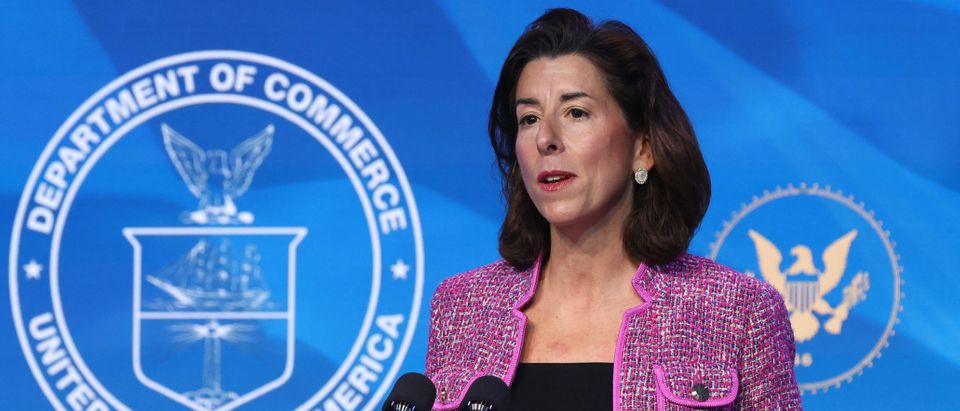Secretary of Commerce Gina Raimondo issued a report Tuesday highlighting the dire state of the ongoing semiconductor shortage in the U.S. and urged lawmakers to pass legislation funding domestic chip manufacturing.
The report, based on information collected from over 150 companies in the semiconductor industry, found that the chip shortage was likely to last well into late 2022, and that demand has increased 17% from 2019 while supply had not kept pace, exacerbating delays and shortages as well as raising prices.
“The median inventory of chips has fallen from 40 days in 2019 to less than five days. These inventories are even smaller in key industries,” Raimondo said in a press release announcing the findings. “That means if a COVID outbreak, a natural disaster, or political instability disrupts a foreign semiconductor facility for even just a few weeks, it has the potential shut down a manufacturing facility in the U.S., putting American workers and their families at risk.”
Raimondo described the need for domestic investment in chip manufacturing as “extremely urgent,” and urged Congress to pass the U.S. Innovation and Competition Act (USICA), which includes $52 billion in funding for domestic semiconductor fabrication.
“I have been engaged daily with members on both sides of the aisle to get this done,” Raimondo said. “Every day we wait is a day we fall further behind. But if we pass this bill and address this problem, we can create good jobs, rebuild American manufacturing, and strengthen our supply chains here at home for decades to come.”
Ohio Republican Sen. Rob Portman said in a statement to the Daily Caller News Foundation that the report illustrated the urgent need to pass legislation funding investment in chip productions.
“Our current supply chain shortage is exactly why passing USICA, and funding the CHIPS Act, is so important,” Portman said. “The report reflects reality: inventories are down while demand is up. We must improve our domestic semiconductor capacity in order to create a more resilient supply chain.”
Two employees work in a clean room of the semiconductor Bosch factory during preparations for the series production of semiconductor chips on innovative 300 millimeter wafers in Dresden, eastern Germany on May 31, 2021. (Photo by JENS SCHLUETER/AFP via Getty Images)
The report also identified specific areas in the chip supply chain that were contributing the most to supply bottlenecks. (RELATED: The Global Chip Shortage Is Driving Prices ‘Sky-High’: Here’s How It Could Affect You)
“The primary bottleneck across the board appears to be wafer production capacity, which requires a longer-term solution,” Raimondo said.
USICA, which passed the Senate in June 2021 but is currently stalled in the House, is a massive bipartisan bill intended to improve U.S. competitiveness with China in technological progress and innovation.
Several lawmakers, including Portman and Ohio Democratic Sen. Sherrod Brown, have urged passage of the bill, citing the need for investment in domestic semiconductor fabrication to boost supply for key industries such as automobile manufacturing.
Raimondo echoed the senators’ remarks, arguing the chip crisis was contributing to worsening inflation.
“In 2021, auto prices drove one-third of all inflation, primarily because we don’t have enough chips. Automakers produced nearly 8 million fewer cars last year than expected, which some analysts believe resulted in more than $210 billion in lost revenue,” Raimondo said. “It is both an economic and national security imperative to solve this crisis.”
All content created by the Daily Caller News Foundation, an independent and nonpartisan newswire service, is available without charge to any legitimate news publisher that can provide a large audience. All republished articles must include our logo, our reporter’s byline and their DCNF affiliation. For any questions about our guidelines or partnering with us, please contact licensing@dailycallernewsfoundation.org.


